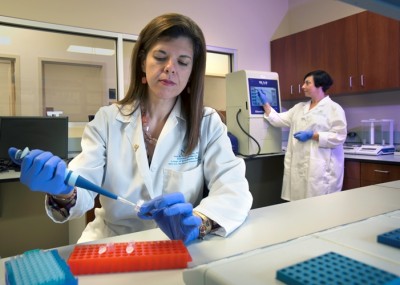NSU Newsroom
SharkBytes
Horizons
This version of NSU News has been archived as of February 28, 2019. To search through archived articles, visit nova.edu/search. To access the new version of NSU News, visit news.nova.edu.
This version of SharkBytes has been archived as of February 28, 2019. To search through archived articles, visit nova.edu/search. To access the new version of SharkBytes, visit sharkbytes.nova.edu.
NSU Researchers Receive $800,000 Grant to Research Gulf War Illness
Serving one’s country as a member of our armed forces is among the most noble professions, but the sacrifices do not stop once soldiers return home and are taken out of harm’s way. Many soldiers face lifelong issues.
At least a quarter of the 700,000 soldiers who fought in the 1991 Gulf War suffer from a debilitating disease called Gulf War Illness (GWI).
GWI is a medical condition that affects both men and women and is associated with symptoms including fatigue, chronic headaches, memory problems, muscle and joint pain, gastrointestinal issues, neurological problems, respiratory symptoms, hormonal imbalance and immune dysfunction.
Paula A. Faria Waziry, Ph.D., assistant professor at Nova Southeastern University (NSU) College of Osteopathic Medicine’s Institute for Neuro-Immune Medicine, and her research team recently were awarded an $805,882 grant from the U.S. Department of Defense’s Congressionally Directed Medical Research Programs to investigate the genomic and cellular mechanisms that cause GWI.
The study is titled “An Integrated Genomics and Cell Biology Approach to Correlate Novel GWI Indicators of Infections and Neuroinflammatory Mechanisms with Targeted Drug Therapy.”
“Little is known about what causes the onset and progression of Gulf War Illness,” said Waziry. “Our aim is to identify specific disease targets that will lead to improved diagnosis and more effective therapeutic interventions for patients. It is our duty to help those who served their country in any way we can, and this is one way we can make a major difference.”
GWI is likely caused by a combination of factors including genomic make-up and environmental exposures, such as toxic chemicals and/or viruses. Further exacerbation or chronic stress during and after war-time may also contribute to aggravation and persistence of symptoms.
In addition to Waziry, who will serve as primary investigator, the research team consists of faculty members from NSU College of Osteopathic Medicine’s Institute for Neuro-Immune Medicine, including Lubov Nathanson, Ph.D., assistant professor and genomics expert; Nancy Klimas, M.D., professor of medicine and director of the institute; Mariana Morris, Ph.D., professor and director of Gulf War Illness research; and Gordon Broderick, Ph.D., professor and director of computational biology.
This work was supported by the Department of Defense Gulf War Illness Research Program under Award No.W81XWH-15-1-0163.
